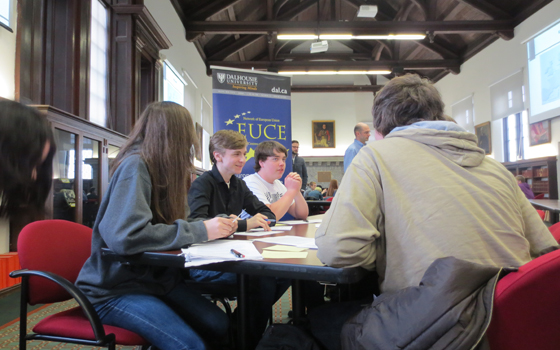Today@Dal
» Go to news mainA great debate

Should Ukraine and Turkey join the European Union?
This real-world questions were tackled by high school students from École du Carrefour Grand-Havre and Citadel High in a debate hosted by ��ɫֱ��’s (EUCE) last Wednesday, April 28.
Sixty-six grade 10, 11 and 12 pre-IB and IB students, divided into eight groups, argued for and against Turkey and Ukraine joining the European Union (EU) for either economic or politico-cultural reasons.
The debates were moderated by Dal students Adrian Pecotic (Philosophy & Contemporary Studies) and Walter Jothiraj (Engineering) of SODALES, the ��ɫֱ�� Debating Society. They were preceded by an introduction of the European Union by EUCE Director and Political Science professor Ruben Zaiotti.
Ukraine has been in the news for the last few months, with civil unrest and both Western and Russian intervention following a decision in November 2013 by then-President Viktor Yanukovych not to sign an Association Agreement with the EU. ��
Students arguing for Ukraine to join the European Union said this partnership would benefit the Ukrainian economy. They argued that there are very few linguistic or ethnic ties to Russia and it should retain the independence it gained upon leaving the Soviet Union in 1991. Arguments against Ukraine joining the EU included historical Russian support for the country, and the current interdependence on Russia for gas supply and exports.
The question of Turkey’s involvement with the European Union has been ongoing since 1999, when it was determined to be a candidate country for membership. The country has undertaken a number of political, economic and social reforms in their quest to become a member state.
Students arguing for Turkey to join the European Union said this would be a mutually beneficial arrangement for both economies, opening up new trade routes and infusing young workers into a declining European population demographic. Opponents to this merger say that Turkey’s economic instability and cultural differences could have a negative effect on the EU.
In the end — as in real life — there were persuasive arguments on both sides and no clear outcomes. ��
The EUCE gratefully acknowledges the support of the Nova Scotia Department of Education and the Faculty of Arts & Social Sciences for their role in this event.

(Krista Armstrong photos)
��
